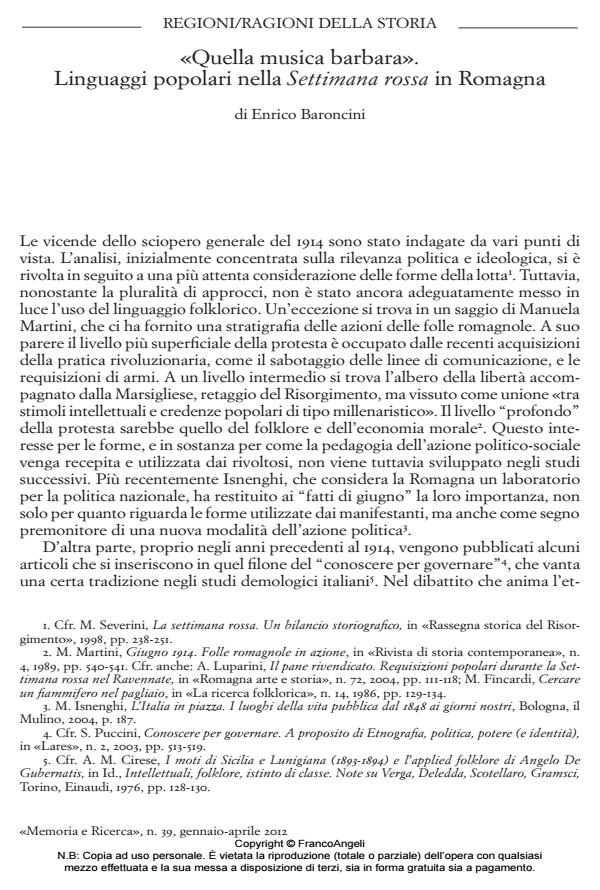"That barbarian music". Traditional langauges in general strike of 1914 in Romagna
Journal title MEMORIA E RICERCA
Author/s Enrico Baroncini
Publishing Year 2012 Issue 2012/39
Language Italian Pages 18 P. 139-156 File size 147 KB
DOI 10.3280/MER2012-039009
DOI is like a bar code for intellectual property: to have more infomation
click here
Below, you can see the article first page
If you want to buy this article in PDF format, you can do it, following the instructions to buy download credits

FrancoAngeli is member of Publishers International Linking Association, Inc (PILA), a not-for-profit association which run the CrossRef service enabling links to and from online scholarly content.
During the general strike of 1914 in Romagna the mobilization of the members of the progressive parties and trade unions was large and unexpected, taking in some cases a revolutionary character. The actions of the protesters, among which there were destruction of churches and railways, were assimilated by the conservative press, and by some of the progressive, as purely criminal acts. In some cases, however, traces of charivari appear, which is an appropriate language for the political aims of the protesters. The use of the ambiguous symbol of the liberty tree in the strike demonstrations in Romagna is analyzed in the various components of both politics and folklore.
Keywords: Traditional cultures, charivari, liberty tree, general strike, popular riots, Romagna.
- Protest, Popular Culture and Tradition in Modern and Contemporary Western Europe Ilaria Favretto, pp.1 (ISBN:978-1-137-50736-5)
- Protest, Popular Culture and Tradition in Modern and Contemporary Western Europe Ilaria Favretto, Marco Fincardi, pp.149 (ISBN:978-1-137-50736-5)
- Protest, Popular Culture and Tradition in Modern and Contemporary Western Europe Xabier Itçaina, pp.229 (ISBN:978-1-137-50736-5)
- Cultures of Protest and Industrial Conflict in Italy since 1945 Ilaria Favretto, (ISBN:9780191888397)
- Protest, Popular Culture and Tradition in Modern and Contemporary Western Europe Marco Manfredi, pp.103 (ISBN:978-1-137-50736-5)
Enrico Baroncini, "Quella musica barbara". Linguaggi popolari nella Settimana rossa in Romagna in "MEMORIA E RICERCA " 39/2012, pp 139-156, DOI: 10.3280/MER2012-039009